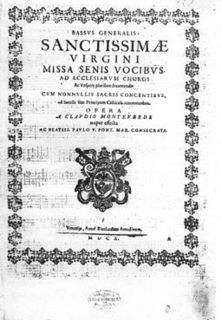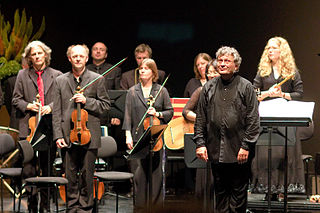
Pietro Alessandro Gaspare Scarlatti was an Italian Baroque composer, known especially for his operas and chamber cantatas. He is considered the most important representative of the Neapolitan school of opera. He was the father of two other composers, Domenico Scarlatti and Pietro Filippo Scarlatti.

Vespro della Beata Vergine, SV 206, is a musical setting by Claudio Monteverdi of the evening vespers on Marian feasts, scored for soloists, choirs, and orchestra. It is an ambitious work in scope and in its variety of style and scoring, and has a duration of around 90 minutes. Published in Venice as Sanctissimae Virgini Missa senis vocibus ac Vesperae pluribus decantandae, cum nonnullis sacris concentibus, ad Sacella sive Principum Cubicula accommodata, it is sometimes called Monteverdi's Vespers of 1610.

René Jacobs is a Belgian musician. He came to fame as a countertenor, but later in his career he became known as a conductor of baroque and classical opera.

Antonio Alessandro Boncompagno Stradella was an Italian composer of the middle Baroque period. He enjoyed a dazzling career as a freelance composer, writing on commission, and collaborating with distinguished poets, producing over three hundred works in a variety of genres.

Francesca Caccini was an Italian composer, singer, lutenist, poet, and music teacher of the early Baroque era. She was also known by the nickname "La Cecchina" [la tʃekˈkiːna], given to her by the Florentines and probably a diminutive of "Francesca". She was the daughter of Giulio Caccini. Her only surviving stage work, La liberazione di Ruggiero, is widely considered the oldest opera by a woman composer. As a female composer she helped to solidify the agency and the cultural and political programs of her female patron.
The Monteverdi Choir was founded in 1964 by Sir John Eliot Gardiner for a performance of the Vespro della Beata Vergine in King's College Chapel, Cambridge. A specialist Baroque ensemble, the Choir has become famous for its stylistic conviction and extensive repertoire, encompassing music from the Renaissance period to Classical music of the 20th century. They often appear with John Eliot Gardiner's orchestras, the English Baroque Soloists and Orchestre Révolutionnaire et Romantique.
La liberazione di Ruggiero dall'isola d'Alcina is a comic opera in four scenes by Francesca Caccini, first performed 3 February 1625 at the Villa di Poggio Imperiale in Florence, with a libretto by Ferdinando Saracinelli based on Ludovico Ariosto's Orlando Furioso. It is the first opera written by a woman and was long considered to be the first Italian opera to be performed outside of Italy. It was performed to celebrate the visit of Prince Władysław of Poland during Carnival 1625, and it was revived in Warsaw in 1628. The work was commissioned by her employer Regent Archduchess Maria Maddalena of Austria, wife of Cosimo II de' Medici. Ruggiero was printed under the protection of Maria Magdalena in 1625, only five years after the first printed opera in Italy. It is the only opera by Francesca Caccini to survive.
The Boston Early Music Festival (BEMF) is a non-profit organization founded in 1980 in Boston, Massachusetts, U.S. to promote historical music performance. It presents an annual concert series in Boston and New York City, produces opera recordings, and organizes a weeklong Festival and Exhibition every two years in Boston. A centerpiece of these festivals has been a fully staged Baroque opera production. One of BEMF's main goals is to unearth lesser-known Baroque operas, which are then performed by the world's leading musicians armed with the latest information on period singing, orchestral performance, costuming, dance, and staging at each biennial Festival. BEMF operas are led by the BEMF Artistic Directors Paul O’Dette and Stephen Stubbs, BEMF Orchestra Director Robert Mealy, and BEMF Opera Director Gilbert Blin. In 2008, BEMF introduced its Chamber Opera Series as part of its annual concert season. The series presents semi-staged productions of chamber operas composed during the Baroque period. In 2011, BEMF took its chamber production of Handel's Acis and Galatea on a four-city North-American tour. In 2004, BEMF initiated a project to record some of its work in the field of Baroque opera on the CPO recording label. The series has since earned five Grammy Award nominations, including a 2015 Grammy Award for Best Opera Recording.
Agnès Mellon is a French soprano who specializes in baroque music.
Gabriel Garrido is an Argentinian conductor specialising in Italian baroque and the recovery of the baroque musical heritage of Latin America.
Pascal Bertin is a French countertenor.
His Majestys Sagbutts & Cornetts (HMSC) is a British early music group founded in 1982. The ensemble presently consists of three cornetts and four sackbuts, with chamber organ or harpsichord. The group frequently collaborates with other instrumentalists and singers, and has an extensive discography on Hyperion Records and other labels.
Emily Van Evera is an American soprano who specializes in early music and Baroque music in historically informed performance.
Concerto Vocale is a Belgian musical ensemble for baroque music.
Jill Feldman is an American soprano who has acquired an international reputation for her interpretation of medieval, baroque and classical repertoires.
Tenet, currently known as TENET Vocal Artists, is an early music vocal and instrumental ensemble based in New York City. They perform on period instruments, and specialize in one-voice-per-part singing. Called “a major force in the New York early music world", TENET maintains a flexible roster of professional musicians from across the US and the world. Their singers have garnered praise for performing with "an uncanny degree of precision”.

Bruno Boterf is a contemporary French tenor, specialising in Baroque and early music.
Jeffrey Kurtzman is an American pianist, musicologist and editor. A professor of musicology at the Washington University in St. Louis, he is known for his research on Italian sacred music of the 17th century, especially Monteverdi's Vespro della Beata Vergine.
Fabian Kelly is a German tenor and choral conductor. As a singer, he is most active in concert, including historically informed performances in works such as Monteverdi's Vespro della Beata Vergine and Handel's Messiah. He recorded a revival of Franz Ignaz Beck's opera L'isle déserte and Mozart's Requiem.